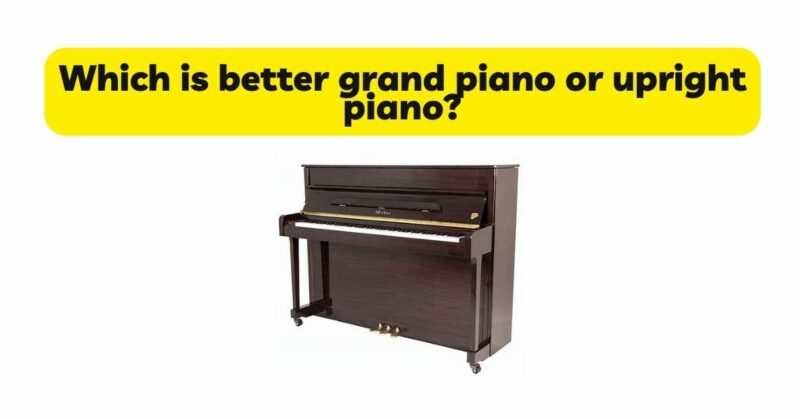The debate between grand pianos and upright pianos has long intrigued pianists, enthusiasts, and music lovers. Both instruments have their unique characteristics, advantages, and limitations. The determination of which is better ultimately depends on individual preferences, musical goals, available space, and budget considerations. In this article, we will delve into the various aspects that define each piano type to provide a comprehensive understanding of their qualities. By examining factors such as sound quality, touch sensitivity, aesthetic appeal, versatility, and practicality, we aim to shed light on the grand piano vs. upright piano debate and help readers make an informed decision.
- Sound Quality and Tonal Range: One of the defining factors in evaluating pianos is their sound quality and tonal range. Grand pianos are renowned for their rich, resonant, and balanced sound. The horizontal string orientation, larger soundboard, and longer strings contribute to their ability to produce a wide range of tonal colors and dynamics. On the other hand, upright pianos have a more compact design and vertical string orientation, which can affect their tonal capabilities. While upright pianos may not match the tonal range and depth of grand pianos, advancements in design, craftsmanship, and tonal engineering have brought certain upright pianos closer to the sound quality of their grand counterparts. Ultimately, the perceived superiority in sound quality is subjective and dependent on individual preferences and musical context.
- Touch Sensitivity and Key Action: Touch sensitivity and key action play crucial roles in the playing experience and expressiveness of a piano. Grand pianos are often favored for their more sensitive touch and precise key action. The longer keys, weighted actions, and sophisticated mechanisms of grand pianos allow for greater control and nuanced expression. However, it is important to note that touch sensitivity and key action can vary among individual pianos, regardless of their type. Some high-quality upright pianos offer touch sensitivity and key action that rival grand pianos, providing a satisfying and responsive playing experience. It is essential for pianists to try different instruments and evaluate their touch and key action to determine which suits their playing style and preferences.
- Aesthetic Appeal and Prestige: The visual impact and aesthetic appeal of a piano can also influence the grand piano vs. upright piano debate. Grand pianos, with their majestic presence, elegant curves, and exposed strings, exude a sense of grandeur and sophistication. They often become a focal point in a room, commanding attention and conveying a sense of prestige. On the other hand, upright pianos, with their more compact and vertical design, can blend seamlessly into various living spaces and offer a more understated aesthetic. The choice between grand and upright pianos in terms of aesthetic appeal depends on personal taste, the desired ambiance of the room, and the statement one wants to make with their instrument.
- Versatility and Musical Style: The versatility of a piano is an essential consideration for musicians who engage in various musical styles and genres. Grand pianos are known for their versatility, allowing pianists to explore a wide range of repertoire, from classical to jazz, pop to contemporary. The expansive tonal range, dynamic capabilities, and sensitive touch of grand pianos make them suitable for different musical genres. Upright pianos, while often associated with classical music, can also accommodate various musical styles. Their compact size and warm sound can be well-suited for jazz, folk, and other intimate genres. The choice between grand and upright pianos in terms of versatility depends on the specific musical goals and preferences of the pianist.
- Practicality, Space, and Budget Considerations: Practicality, available space, and budget considerations are crucial factors in determining which piano is better for an individual. Grand pianos require more substantial floor space due to their larger size and shape. They are typically better suited for spacious rooms and professional performance venues. Upright pianos, on the other hand, have a more compact footprint and can fit comfortably in smaller spaces such as apartments, studios, or practice rooms. Moreover, upright pianos are generally more affordable than grand pianos, making them a more accessible option for many individuals. The choice between grand and upright pianos depends on the available space, budget constraints, and the intended use of the instrument.
- Emotional Connection and Personal Preference: Ultimately, the decision between a grand piano and an upright piano is deeply personal and often guided by an emotional connection to the instrument. Some pianists have a lifelong dream of owning a grand piano and find immense joy and inspiration in playing on a grand instrument. Others may feel a strong affinity for the warmth and intimacy of an upright piano. The emotional connection and personal preference can outweigh technical considerations and practicality. It is crucial for individuals to choose a piano that resonates with them on a personal and emotional level, as it will enhance their enjoyment and dedication to playing the instrument.
Conclusion: The grand piano vs. upright piano debate ultimately boils down to individual preferences, musical goals, available space, and budget considerations. While grand pianos are often favored for their sound quality, touch sensitivity, and visual impact, upright pianos offer practicality, versatility, and affordability. Advancements in upright piano design and tonal engineering have brought them closer to grand pianos in terms of sound quality and playing experience. Ultimately, the choice between grand and upright pianos should be driven by personal preferences, musical aspirations, available space, and budget constraints. It is important for individuals to try different pianos, evaluate their unique qualities, and choose the instrument that resonates with them emotionally and enhances their musical journey.


